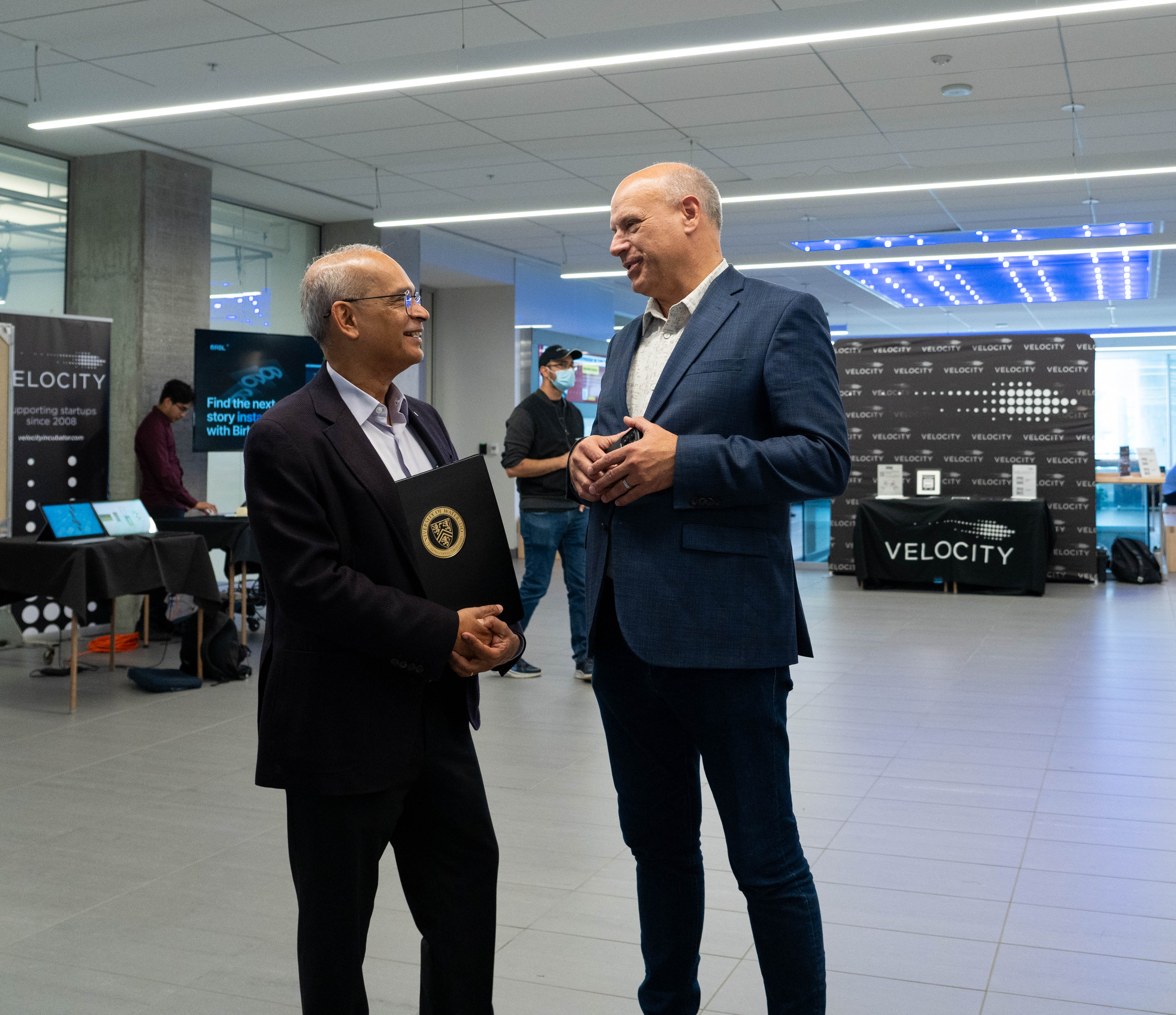
Will AI replace journalists?
Waterloo researchers share their expertise in AI with leaders from international media organizations

Waterloo researchers share their expertise in AI with leaders from international media organizations
By Ryon Jones Media RelationsThe University of Waterloo hosted a global network of national news agency leaders on campus this week to share the expertise of our AI researchers.
During their visit to Waterloo, over 70 news agency business executives explored AI in action. They were treated to displays by representatives from Waterloo's startup incubator, Velocity, RoboHub - the home of robotics at Waterloo, and the Critical Media Lab (CML) – a cross-disciplinary, research-creation initiative which fosters the development of new media projects that explore the impact of technology on society and the human condition.
The group, which included leaders from national news agencies such as L'Agence France-Presse (AFP), The Associated Press (AP), Reuters and The Canadian Press (CP), are members of the Media Innovation Network (MINDS). MINDS is a non-profit organization in which news agencies work together on new concepts for the media industry. They came to Waterloo to learn about how AI may disrupt their industry and how they can use tools like ChatGPT to their advantage.
"Such an illustrious group of media leaders deciding to visit the University of Waterloo to seek insight on how AI will impact their industry is a testament to the reputation our faculty and students have built as innovators in the field," said Vivek Goel, president and vice-chancellor of Waterloo, who delivered opening remarks. "Our researchers are committed to sharing their knowledge and expertise for the benefit of society."

Vivek Goel, president and vice-chancellor of the University of Waterloo, talks with Malcolm Kirk, The Canadian Press president, during the Media Innovation Network visit to Waterloo.
Twice a year, MINDS organizes conferences for its members. Participants are senior managers from all relevant areas of the news agency business – board, editorial, strategy, technology, products, and sales. MINDS Conferences provide a great opportunity for networking with news agencies' decision-makers. They are intended for an exchange of thoughts and experiences, for getting impulses for new business, as well as the chance to explore collaboration in many ways.
The 35th MINDS conference, which The Canadian Press is hosting, is totally dedicated to artificial intelligence-related topics.
"We approached the University of Waterloo to be a stop for this three-day conference because of the range of faculty and researchers currently working in AI at the institution," said Malcolm Kirk, The Canadian Press president. "The University of Waterloo has positioned itself as one of the leading institutions in Canada when it comes to research and investment in artificial intelligence. We were immensely fortunate to learn from the institution's incredible expertise."
Professors Joel Blit and Jimmy Lin presented to the attendees on the meteoric rise of large language models (LLMs), such as ChatGPT, and how business executives can unlock its transformative potential.
Dr. Lin, a professor and the David R. Cheriton Chair in the David R. Cheriton School of Computer Science, took a closer look at why LLMs are special and what is generative AI.
"Unlike traditional AI models that are primarily used for tasks like classification or prediction, generative AI models are designed to generate new data that resembles the training data they were exposed to," Lin said.
Dr. Blit, professor in the Faculty of Arts, discussed the three phases all general-purpose technologies go through.
"The first phase is 'replace', when a new technology displaces old technology or humans," Blit said. "The second is 'reimagine', when processes and business models fundamentally change to leverage the new technology. The third phase is 'recombine', when the technology is combined with other new or existing technologies to create a completely new use case or application."
The third aspect of the afternoon's activities was a panel discussion moderated by Andrea Baillie, editor-in-chief at The Canadian Press. The panel comprised Dr. Lennart Nacke, professor and associate director, Stratford School of Interaction Design and Business, Dr. Marcel O'Gorman, professor and university research chair and founding director of the CML, Dr. Sirisha Rambhatla, professor in the Management Science and Engineering Department where she leads the Critical ML Lab and Dr. Will Zhao, professor of organization and human behaviour at Waterloo's Stratford School.
The panel fielded questions about how media outlets can protect their role as disseminators of trusted information and the challenges and opportunities generative AI presents to news organizations.
"The role of media organizations is definitely going to expand," Rambhatla said. "These generative AI models can help speed up writing, but they are still, what I call, 'fancy regurgitators' of language and in no way arbitrators of facts. This means the focus of personnel will shift to performing in-depth analysis and research."
The afternoon activities concluded with attendees engaging in small group discussions with Waterloo's researchers.

Read more
Researchers developed a process to reduce the amount of energy needed to run data centres

Read more
Here are the people and events behind some of this year’s most compelling Waterloo stories

Read more
It Started in Waterloo: An Astronaut's Journey into the Universe of Innovation, narrated by Chris Hadfield, highlights the University of Waterloo’s role in igniting innovation within the region and beyond.
The University of Waterloo acknowledges that much of our work takes place on the traditional territory of the Neutral, Anishinaabeg, and Haudenosaunee peoples. Our main campus is situated on the Haldimand Tract, the land granted to the Six Nations that includes six miles on each side of the Grand River. Our active work toward reconciliation takes place across our campuses through research, learning, teaching, and community building, and is co-ordinated within the Office of Indigenous Relations.